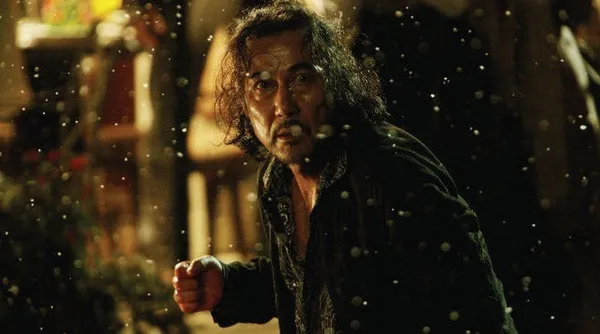Eye For Film >> Movies >> The World Of Kanako (2014) Film Review
The World Of Kanako
Reviewed by: Owen Van Spall

Tetsuya Nakashima swaps the sleek, slow burning creepy horror aesthetic of his previous film Confessions for a pedal-to-the-metal, lurid ride through the grim Tokyo underworld in The World Of Kanako. With a twisted father-daugher dynamic at the heart of the plot, and a setting that takes in not just nightclubs and dark alleys but an innocuous Japanese high school which is the site for some sordid goings on, it comes off a little like a collision between Oldboy and Spring Breakers. But despite a breakneck pace and a certain delirious, visceral punch, the film outstays its welcome.
The plot centres on the travails of a former detective who makes Harvey Keitel’s Bad Lieutenant look like a rookie on his first day. Private investigator Akikazu Fujishima (Yakusho Kôji )is the kind of investigator who slaps first and asks questions later. Apart from being a former police officer, we soon learn that he is now also an alcoholic who is estranged from his wife, and a man whose night time activities involve hard drinking, reckless driving, and beating his wife’s lover half to death after ramming his car. He is also on a variety of medications, which are presumably not helping his sense of perception even if they are restraining his hair trigger temper. Then one day, he gets a phone call from his despairing wife that their teen daughter, Kanako (Nana Komatsu), has gone missing from her high school. Despite seeming to view his family, and humanity as a whole, as obstacles to kick out of the way on his path to getting to the nearest bar, Fujishima launches himself into the task of finding his daughter like the proverbial bull in a china shop.

Quite why Fujishima is so fixated on getting Kanako back, when people in general seem to make him instinctively slap them, is a mystery for most of the film. Maybe his booze-sodden masculinity sees a chance at redemption. At certain times he expresses a wish to find his daughter so he can simply throttle her himself. To call Fujishima’s investigation an “investigation” is something of an exaggeration. Nakashima has his antihero not so much investigate as stumble into various ambushes by underworld mobsters who have their hooks in the school cliques, punch various people in the face (both men and women) after knocking on their front doors, assault several schoolkids, rape several women - including his wife - and get shot to pieces in the process without so much as a hospital pit stop. The action moves from the high school cafeteria to underground raves to dark sewers, with Fujishima increasingly a bloody, sweaty and raggedy mess. But his daughter turns out to have been leading a secret life of her own, and the more Fujishima explores his weird family tree, the more he comes to see that the girl at the end of his journey might be the real monster of the pair of them.
Nakashima keeps the editing rapid fire, mixing up the chronology and perspectives of events and intercutting the full-throttle investigation strand with surreal neon-drenched sequences that slowly reveal the nature of Kanako’s harrowing high school double life that Fujishima was ignorant of until now. The film ends up not only telling Fujishima’s tale, but also the backstories of Kanako’s fellow pupils who fell into her dangerous orbit. One thing that unites all these strands is unrelenting violence. Fujishima regularly doles out slaps, punches and bullets to those around him. He is not one of those film detectives whose asshole nature is counterbalanced by a genius intellect or a rapier wit: he is simply a thug whose mode of address is either grunts or screams. Kanako’s high school turns out to have been no sanctuary either. Even before Fujishima shows up to start battering those particular pupils who he thinks might know where Kanako is, a regime of concealed exploitation and terror is already in place. It seems there is nowhere the darkness does not reach in this world, and in this The World Of Kanako is maybe not so far way from Confessions after all. “The human feelings of love and hate are not always so far apart,” Nakashima has said in interviews, “Kanako is a film I felt that I had to make.”
But despite some stylishly staged action sequences, a throat-grabbing powerhouse of a performance from the lead actor, and arresting editing and visuals, director Nakashima overcooks the pudding. The film certainly has appeal as something of a homage to exploitation flicks of old, and for being a work happy to push the envelope in general with a medley of visual and tonal approaches, moving from horror to whimsy, and from gritty to psychedelic, on a dime. However, the conveyor belt of scenes of violence moves the viewing experience from thrilling to numbing eventually, and the film sails past what seems like at least three natural end points. The script also doesn’t develop the characters in as interesting a direction as might have been hoped for. Fujishima is not a particularly talkative or charismatic figure to follow, he simply stumbles around swinging his fists, and the real truth that lies behind his connection to his daughter is hobbled by her being off screen for much of the film. When the revelations come, they just lack the kind of impact that Oldboy had, as the film has battered you into submission long before that.
Reviewed on: 11 Oct 2014















